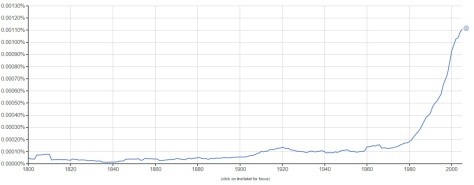When I was young I wanted a secret language; one that my sister and I, or maybe a handful of friends, could comprehend. We could talk about anything we wanted in this language: school, turtles, our hopes and dreams, and other people we liked or disliked. But mostly I wanted a secret language because it set me apart. I’d be able to speak English just fine to those outside my Secret Language circle, and they would be impressed and awed by my abilities. I’d have something they didn’t have.
Category Archives: Language & Linguistics
Logorrhea
I have seen and read Shakespeare’s famous tragedy, Hamlet, more than any other work by the playwright. We are all familiar with the play to some degree or another; or at least heard it quoted: “To be or not to be” might be the most famous line from any play in the English language. After the story of Cinderella, it’s the second most filmed story in the world. I read someplace that Hamlet is being performed somewhere in the world every minute of every day. If you don’t know the plot? Well… Watch Disney’s The Lion King and you’ll get most of the story. Except in Hamlet everybody dies at the end, except for poor Horatio (Hamlet’s best college buddy), who walks onto stage and has his Elizabethan equivalent of a WTF moment.
If I Could Talk to the Animals…
I took a walk through our neighborhood this morning, past the golf course, and nearly to Alex’s high school. It’s about a mile to get there.
I “discovered” the trail about a week ago, on a perfectly beautiful April evening when I wanted to get out of the house just relax. Discovered is a bit of a misleading term because I could hit Lake Audubon Trail with a pine cone from our bedroom window. I just never bothered. We’ve lived here sixteen months, and I hadn’t yet felt energetic enough,to explore our neighborhood. I’ve been using the CPAP machine for 2 weeks. It took about 7 days before I felt enough energy to get out and enjoy the day.
@
I was scrolling through Facebook this morning. I saw the usual uninteresting stuff; you know, the types of things with ridiculous titles like “This dog was on the couch and fell asleep: you won’t believe what happens next,” when I ran across a brief mention of the guy who in 1971, sent the first email. His name was Ray Tomlinson, and he died two days ago. He was a member of the Internet Hall of Fame (and yes, there’s apparently an Internet Hall of Fame) because it “brought about a complete revolution, fundamentally changing the way people communicate.” Impressive. And I’d have to agree. Who among us hasn’t got an email? Nobody reading this blog, I’d suspect.
But what fascinated me more was the next sentence of his obituary. It claimed that he “singlehandedly repopularized the at-sign. You know, this:

It’s a good sign. I love punctuation and symbols anyhow, so I immediately had to look up the history of the thing. Wikipedia has a good article on it, so I won’t bore you with the historical details except that it’s been around for at least 600 years. In that time, well, we didn’t use it much. It has a pretty specific meaning and isn’t exactly popular in literature. That is, until Mr. Tomlinson.
I looked it up. I was unable to resist. Google’s ngram viewer records each instance of a word in in their very, very large database of literature and documents. Check it out. Have fun! So did he really repopularize the at sign? Let’s see…
Here’s the graph of Google’s recorded usage of the symbol @ since 1971:

You can click the image to embiggen, by the way. In the space of about 35 years, the the at sign has gone from showing once every 10,000 characters to once every 1,000 characters. That’s pretty impressive, if you give it a bit of thought. In 1971, the word computer was known to science fiction nerds and university eggheads.
In 1971, I was three years old. The moon landing was just 2 years in the past, made possible by brute-force technology and machines-that-go-ping. The game Mastermind was just a board with holes and, to me, plastic bits that looked like M&Ms. Intel created its first microprocessor that year. Richard Nixon was still a pretty good guy, and was Time Magazine’s Man of the Year. Ed Sullivan and The Beverly Hillibillies were cancelled.
Okay, compare to 1981: the year the IBM PC computer was released, and Voyager was taking amazing pictures of Saturn. Some crazy named John Hinkley Jr. tried to kill Ronald Reagan. The Center for Disease Control AIDS, a kind of pneumonia affecting gay men.

After that, well… you know what happened. There was this thing called the Internet. Windows 95 overwhelmed us all. We all joined AOL.com, and then left AOL.com. We said the words “Information Superhighway” way too often, and danced the Macarena. We all got email addresses with little @s in them.

Quick at-sign facts:
- In Renaissance Portugal and Spain it was a unit of measurement: You could buy an @ of wine
- In contemporary Portugal, the @ is an emoticon that means I’m kissing you… with tongue!
- Traditionally, the Dutch call the symbol “apenstaartje“, which means “little monkey tail.” Today, they call the symbol “at,” presumably because it’s easier to pronounce. Germans, Romanians, Poles and Croats follow suit. The Scandinavians generally refer to the symbol as “elephant’s nose”. Russians and their neighbors call it “dog” or “dog tail.” The Hungarians call it a worm or a maggot. The Hebrew language calls it a strudel, presumably because it looks like one.
- A few years ago, a Chinese couple tried to name their son @—pronouncing it “ai ta” or “love him”
Ok. Thanks for indulging my little brain exercise for today. And thank you, at-sign for being there. And thanks, Ray Tomlinson for that email thing you invented! I sent one to somebody just the other day, and never even gave it a second’s thought. Pretty remarkable, when you think about it. 45 years ago, when he was busy inventing email, I was eating crayons and picking boogers. Now I only do one of those things, and afterwards I can send an email about it!
It’s all Good… I Mean Dank
That’s Dank.
Yo.
Recently I had to ask a co-worker what “dank” meant, and if it’s a good thing. He had recently described something as dank. I understood from his context that he didn’t mean “cold and musty.”
He laughed, “Where’d you hear that word?”
“You just said it,” I explained. “So, is it good?”
“Yeah, it’s very good,” he told me. “It’s a stoner term you know. Stoners say that things are dank.”
Uh, remember when I just said you used the term?
Oh, yeah, bro. The dankness overwhelmeth me.
The rest of the night, I was sure to be marginally annoying by referring to things as Dank. “These new pastries are very good. In fact, I’d go so far as to describe them as dank. They are supreme in their dankness.”
Stuff being dank doesn’t work when you’re in your forties, kids.
At some point I got old. I don’t know when it happened. I remember when things were radical, awesome, bitchen, tubular, even gnarley (which was both good and bad at one point. Now I think it’s evolved to surfer talk for only bad). I survived copasetic, bodacious and cool. Fab, boss, funky, groovy, tight, The sixties had far out, and outta sight. My opinion: they were worried about not seeing stuff in the sixties, so they used lots of drugs, which led to sex, which led to radical kids (they never were all that radical), which led to to dank grandchildren. Hip (hep), neat (neat-o) and keen (keen-o) were a bit before my time but I may have used them, once in awhile. Aces? Snazzy? My Granny Spurgeon used to say snazzy. So was swell. I make sure to use them all because I don’t want anybody to know how old I am by my language.
I’ve heard killer, “the shit”, “the bomb,” “the shit bomb”. Some good things are actually bad. Michael Jackson tells us he’s “bad, I’m bad… you know it. OOO!” So how do we know anymore? I wouldn’ be surprised if some kid eventually comes up to me and says “That hat is the explosive diarrhea!” and it’s actually a good thing.
By the way–if you say you’re apt to say “killer” or “I’m the bomb,” or “I’m radical,” I’d recommend not using slang if you happen to be going through an airport security line.
How about fly, chill, crunk, sweet, insane, dope, crazy, wicked? Are these words off the hook or what? Oooh! Off the hook. Different than off the rack, which is definitely not off the hook.
I had a professer (Norman Arnesen, if anybody is wondering) use the term “the bee’s knees” in conversation with a totally straight face. Cat’s pajamas anyone? What about the cat’s meow? Killer diller?
Why does it mean one thing if you say “you’re the shit,” and another if you say “you’re shit?” And what about puncutation? If you say “your shit” you need a verb. Stinks comes to mind.
I have also noticed modifiers–all of them are variations on “very”… Hella, hecka, mega, epic, mongo, leet, über, –that’s a good one. We have a dearth of words in English with umlauts. Ever notice, by the way, that the word umlaut doesn’t have an umlaut? I think there should be an ANSI code so I can type an umlaut-N for every time I reference the movie Spinal Tap. Granted, this is the first time, ever, I’ve referenced the movie Spinal Tap.
We also have très, super, ultra, you know… comic book superhero terms. Make you own! Mix and match. Norm Arnesen should have said “That seminar was ‘hella-the bees’ knees’.” Best super hero name ever!
So, I may not be dank, but I know people who are.
Which words do you find yourself using? Are you stuck in a decade?
Top-Shelf Words
I just got home from work. Apparently Super Bowl Sunday isn’t the busiest time of year for us. I spent the last two hours walking around, cleaning things, then walking around only to clean them a second time.
Hapax Legomena
Honorificabilitudinatatibus: that’s a nice long Shakespearean word to start your morning. Hope you’ve had your coffee!
Shakespeare used it only once in his entire body of work. To use a word only once in your entire body of work is called a Hapax Legomenon. These are remarkably important words for people (and I admit I am used to be of them) who count and rank words for a living. Continue reading Hapax Legomena
Politically Correct? or Just Correct.
Language, it turns out, is pretty important. After all, how do you complain to tech support, or order fast food, or be sarcastic, if you don’t use language? Language can be used to persuade, inform, convey emotion, and, this is becoming more clear to me every day, hurt people. Continue reading Politically Correct? or Just Correct.
An Exaggeration, an explanation, and Two Apologies
I’m sitting at the computer with a plate of salsa, cheese and Triscuits. Dinner has been served, and I was still feeling a bit snacky, so I grabbed a couple snackies. And yes, the autocorrect really wanted to make Triscuits into “tracksuits.”
It’s pretty much a non-blog day. I have little of consequence to share with you. It was a morning-to-mid afternoon workday, where I made drinks, and handed folks sandwiches, and filled the ice bin several times. Iced drinks sold like hotcakes today (it’s my blog – I can use a lousy simile whenever I want!) because it made it to 92°F (33°C) today. We never really got a springtime. It snowed a couple weeks ago, had 14 days of completely inoffensive weather, and yesterday we blasted into the era of Hot Friggin April.
I noticed somebody exaggerating today. They told someone something, and the warm weather stretched the fabric of their facts just a leeeetle bit. I didn’t say anything, just shook my head in resignation. It really annoys me. It’s a pet peeve, if you will, having somebody do that. It seems to just aggrandize their deeds just a little bit, propping up their maybe-fragile ego. Jerks.
Then, I realized, I do the same thing ALL the time. For example, I didn’t wait 2 hours for my kids. I waited 1. But I said 2, because I’m an insecure jerk with a fragile ego. My fragile jerkish ego says I only got 1/4 of the piece of chicken, when really I got a whole piece and I wasn’t really hungry in the first place. But exaggeration makes my story better, see?
I’m a pinhead. I try to avoid it. Before I know it, a lie (let’s call it what it is, folks) slips out, and I try to make myself look a teensy bit better, or more trodden upon, or harried. Maybe it’s to gain sympathy. Maybe it’s to make me seem “special,” if for just a second.
I also exaggerate when I’m joking. For example today, I told a friend that we should buy wax, and teeny combs, and join a Mustache Club together. We’d be mustache twins, I told her! She politely declined, insanity not having eaten away the better part of her judgment apparatus. A stupid joke, to say the least. But my point is, what is a joke, if not an exaggeration? Comics do this all the time. It’s a game of exaggeration, or embellishing the truth the entire time they’re on stage. But somehow it’s different.
The difference is in the verbal contract. All conversation is a “contract” between the speaker, and the recipient of that conversation. In a dialog, people take turns being the speaker, and the listener. Normal places and situations (like work, or church), we expect truth, or the contract is broken. If the child in the back seat shouts “Mommy! I really have to go potty now!” and forces mother to pull over, the child had better pee (or at least make a good effort of it), or we know what’ll happen next. Broken contract? Bad news.
In comedy, the recipient expects to be fooled. Several times, all night. The funny comes when words are twisted, stories are ludicrous, and situations are untenable. Take, for example, the words of Steve Martin: “I slit this sheet; this sheet I slit / And on this slitted sheet I sit.” Say it five times fast. If you’re not laughing (or at least horrified), then please ask yourself why not? The words are twisted. The story it presents are ludicrous. The possibilities are untenable. Comedy gold! And he didn’t even need to wear an arrow through his head.
If I’ve exaggerated to you in the past, I’ve broken contract. I want to apologize to you for it. If I’ve done it while being funny, I hope it didn’t go over like the proverbial lead balloon. If I’ve come down on you when I’ve found you exaggerating, I’m sorry for my hypocritical attitude. I’m a pig. It’s what I’m good at, so I hope you can make allowances.
Nothing too profound today. Just a few exaggerations, an explanation, and an apology. Be well, folks.
Giving a F^(# about Language
Almost exactly a year ago (350 days ago, to be exact), I wrote a post about swearing. In case you want to read the whole thing, I’ve linked it here. Regardless, I wanted to highlight a few points about good ol’ invective, and how it’s affected me. I recently felt it was time to revisit the whole thing because… well, because I wanted to.
In the thirteen months I’ve been writing this blog, I consistently harp on this point in as many ways as possible: words matter.

In July I wrote a post that elicited as much vitriol because of its subject matter (accepting LGBTs in your church) as because of the sentence where I referred to the Bible as a “musty 2,000 year old document.” I was told by one that I had “done great damage to the Kingdom [of God].” That’s debatable. Anyone who had read my statement in passing, and actually changed their mind about something… well, I’d guess their Kingdom wasn’t very stable in the first place.
I was raised in the Church, attended a Bible college, and then worked in that same academic environment for nearly 20 years of my adult life. Swearing was one of those litmus tests that, for Christians, separated the sheep from the goats. The goats were the ones who swore. I was a goat.
Recently I saw a pastor whose blog I frequent (don’t click the link if you’re even a little bit worried about having your faith challenged), who dropped the F-Bomb. An upset person droned up all the usual arguments: “We are a people set apart” and “They shall know us by our fruits” and… yeah. I don’t buy it. I think people are thin-skinned. I don’t mention this in defense of him by any means. He’s a big boy and can fend for himself; I’m just qualifying my words matter mantra with the following: when you get upset, remember what your mother taught you: “Sticks and stones may break your bones….” Really. Words matter, but words can’t ultimately hurt you. I think God has better stuff to do than to be a language cop. Why do I think this? here’s an extract from my Feb. 2011 blog on the matter:
I realized, sometime during my year [in France], that words had different levels of meaning there. For example, “shit”, in English, has a much heavier connotation than merde does in French, even thought they translate to the same idea. Similarly, putain, even though it means “whore” is roughly the equivalent of saying “fuck” in English. So, we have to ask ourselves, are we as a culture afraid of the word itself? Or does it come from the idea of that word? The French word biche. Any guesses? It means “doe” (A deer. A female deer). Tant pis means “oh well,” and has nothing to do with piss. Un bon phoque means “a good seal,” and not… well, you get the picture…
I ended the paragraph with the following: “If we shy away from a collection of morphemes grouped in a certain way, then we’ve just unknowingly condemned a lot of folks to Hell.” I stand by these words a year later, and urge everyone to look beyond the delivery of the message, to see the message itself. You might be missing out on a lot by taking offense at a random collection of fucking syllables that are only meaningful in a handful of cultures, on a globe of seven billion people.
